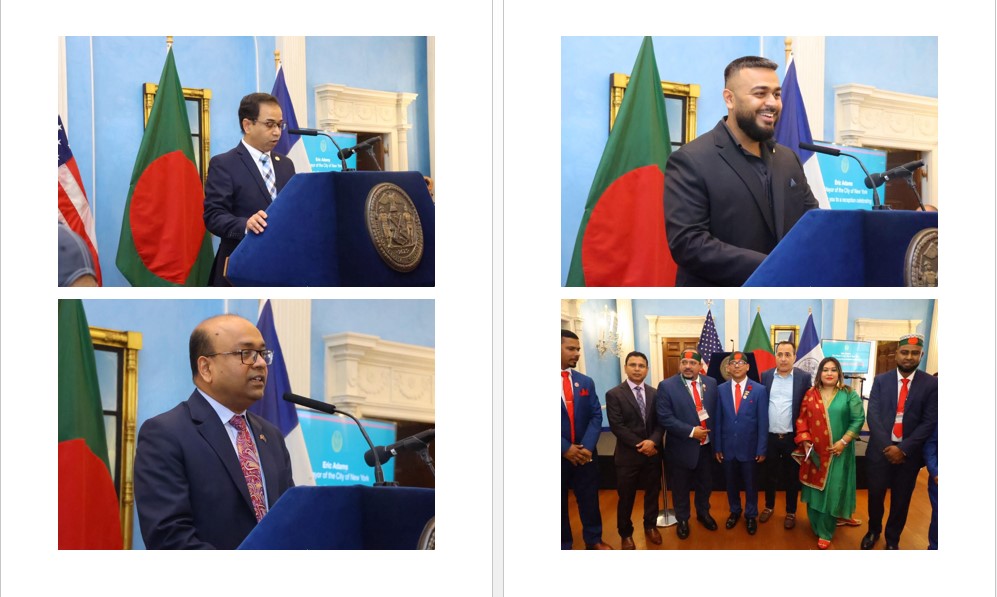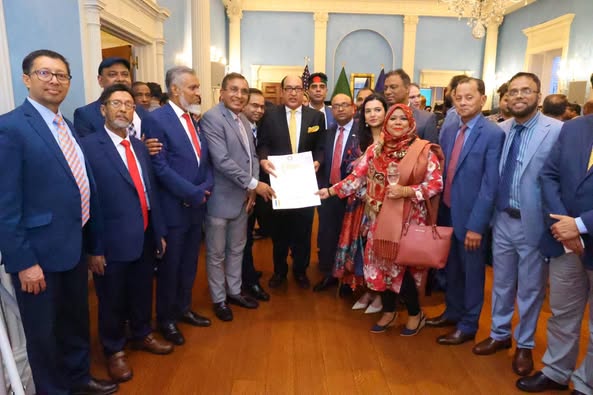Community Leaders and Professionals Honored for Achievements
Abdul Alim:
In a groundbreaking celebration of cultural pride and civic inclusion, Mayor Eric Adams hosted the first-ever Bangladesh Heritage Night at Gracie Mansion on April 3, 2025, marking a historic milestone for New York City’s vibrant Bangladeshi-American community. The event, organized with the support of the Bangladesh Society, brought together over 400 attendees from across the city, including community leaders, professionals, public servants, and interfaith representatives.
For many, this celebration was not just a festive gathering—it was a symbol of belonging. “Why did it take 110 mayors before the Bangladeshi flag was raised down at Bowling Green? Why did it take so long for you to have a Bangladeshi Day here in Gracie Mansion? Your Gracie Mansion,” Mayor Adams asked, passionately addressing the crowd. “Just as I must be substantive, I must be symbolic because your children are watching.”
Throughout the evening, speakers reflected on the contributions of Bangladeshi Americans in shaping the city’s cultural, professional, and civic life. Mir Bashar, the highest-ranking Bangladeshi staff member in the Mayor’s Office and the event’s emcee, welcomed guests by declaring, “Our cultural influence is vivid and can be felt throughout the five boroughs… These local experiences along with our tradition are the testament of the incredible cultural mark Bangladeshi has left on New York City.”
Chief Advisor to the Mayor Ingrid Lewis-Martin brought warmth and humor to her remarks, expressing admiration for the attendees’ traditional clothing and acknowledging the sacrifices and service of Bangladeshi police officers in the city. “Our minority communities such as the Bangladeshian community believe in law enforcement and believe in safety and public safety,” she said, highlighting their role in upholding the values of the city.
Mayor Adams emphasized the vital contributions of immigrant communities like the Bangladeshis to the American fabric, asserting, “You're not American Bangladeshis. You're Bangladeshi Americans. I’m African American. A Chinese person is Chinese American. You never have to shred all that you bring from your dance, your food, your attire, your culture, your religion, your belief. You're supposed to bring that with you to make this great experiment of inclusiveness that this country represents.”
The mayor also highlighted the concrete achievements of his administration, such as improved public safety, economic recovery, and inclusionary appointments across various ethnic communities. “It took too long to have the first Dominican deputy mayor, the first Filipino deputy mayor, the first Korean leading small business services, and so on. We didn’t just open the door—we took the door off the hinges so it could never be closed again,” he declared to resounding applause.
Several prominent Bangladeshi Americans were honored during the evening. Among them was Ruhin Hossain, founder of Rivertel, the first national telecom enterprise in the U.S. owned and operated by immigrants. “Rivertel offers unlimited international calling to 180 countries and serves in eight languages. We are launching hundreds of stores next year,” he said proudly.
Dr. Shamim Ahmed, a healthcare pioneer, was recognized for his service to the South Asian community through his leadership at Interfaith Medical Center and GetWell Med-Care PC. “We are here as a community to serve and survive in this great country. And I am grateful for this opportunity,” he said humbly.
Cultural preservation was spotlighted through the work of honoree Manika Choudhury, founder of Shilpakala Academy USA. She thanked the mayor and her fellow organizers for supporting the arts and ensuring the rich traditions of Bangladesh remain visible among the diaspora.
Finally, Abdul Chowdhury, a dynamic entrepreneur in healthcare and hospitality sectors, offered a candid and heartfelt acknowledgment of the journey the community has taken. “We never had access to the Mayor’s Office like before. But we are a hardworking, patient community—and yes, we will ask for more, because we are deserving of it,” he stated.
The celebration was more than ceremonial—it marked a renewed partnership between City Hall and one of New York’s fastest-growing immigrant communities. From traditional cuisine to community pride, the evening encapsulated what Mayor Adams referred to as “a city we all love and admire… one our children can grow up in and be proud of the legacy we’re living.”
The Bangladesh Society’s initiative, in collaboration with the mayor’s office, was hailed as a defining moment in mainstream civic engagement for the Bangladeshi community. As Bashar concluded the event, he said with pride, “This effort will serve as an inspiration for the next generation and strengthen the spirit of cultural pride and community leadership.”
The evening closed with music, food, and fellowship—but its message echoed far beyond the walls of Gracie Mansion: Bangladeshi Americans are not just part of New York City they are helping shape its future.


